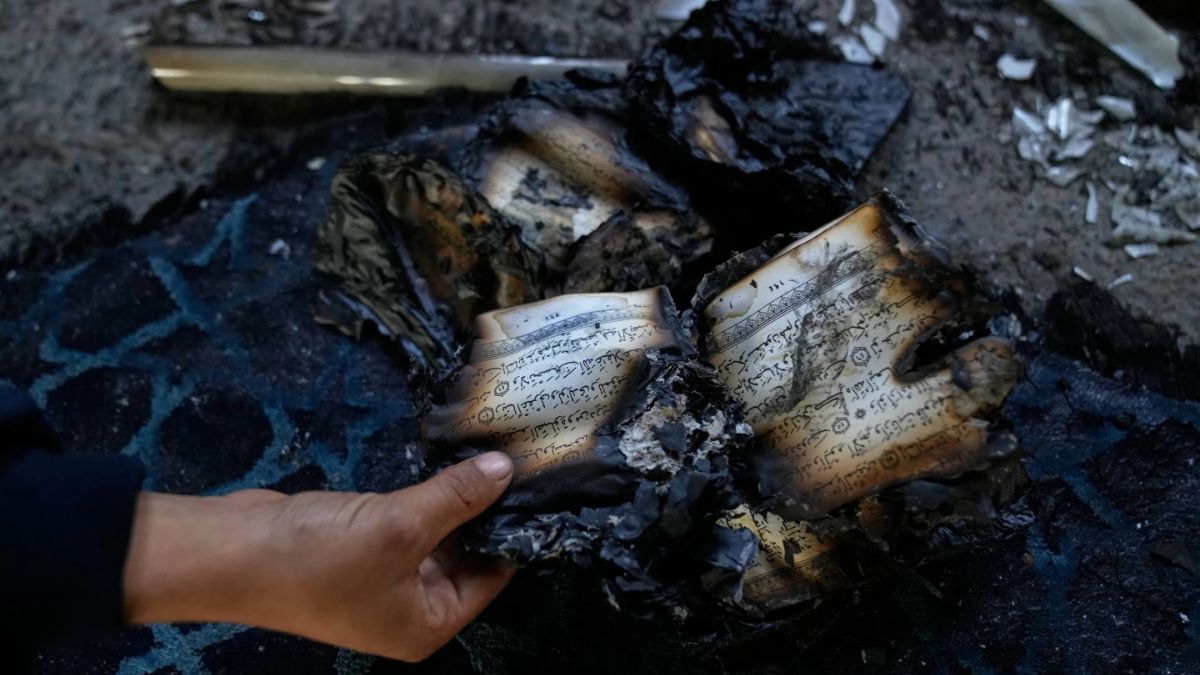EXPLAINED | What is behind growing settler violence in the West Bank?

Settler violence in the occupied West Bank has surged to levels not seen in many years, creating growing alarm among Palestinian communities, Israeli security officials, and international observers.
The latest incident—the burning of a mosque in the village of Deir Istiya on Friday—has become a stark example of what many describe as a deteriorating security environment shaped by political shifts, a permissive climate for extremist activity, and a widening gap in the treatment of Palestinians and Israelis under occupation.
Although the mosque was empty during the attack, the fire destroyed Qurans, scorched the prayer hall, and left graffiti insulting the Prophet and mocking senior Israeli military commanders. For Palestinians, it was yet another sign of a crisis that has intensified since the Hamas attack against Israel in October 2023.
According to human rights experts and international monitors, settler attacks against Palestinians and their property have accelerated both in frequency and severity.
October recorded the highest number of documented incidents in nearly two decades, reflecting a pattern of intimidation that has displaced many Palestinian families from rural areas. The violence has included assaults on villages such as Beit Lid and Deir Sharaf, where masked groups set fire to cars, targeted a Bedouin community and torched trucks belonging to a Palestinian dairy company. During the olive harvest, a time of economic significance for many Palestinian families, hundreds of trees were damaged and farmers were assaulted or forced from their fields.
One of the most significant factors behind the growing settler violence is the widespread sense of impunity.
Human rights organisations and UN agencies have repeatedly concluded that investigations into settler violence rarely lead to indictments. Palestinians argue that this failure to hold perpetrators accountable encourages further attacks.
Israeli military officers have expressed similar frustrations, noting that law enforcement in the territory is hampered by political decisions that limit the ability of security forces to restrain violent settlers. This year, the government restricted the use of administrative detention against Israeli citizens: a measure previously employed against settlers deemed at risk of planning attacks. The move was regarded by some commanders as a political concession to hardline factions.
A second driver of the violence is the broader political climate in Israel. Netanyahu’s far-right coalition contains several leaders from the settler movement who encourage settlement expansion and are completely opposed to the two-state solution.
It has turned out into a clear signal to extremist settlers that they enjoy political support and cover. Ministers in key positions have advanced policies that Palestinians believe aim to entrench Israeli control over the West Bank.
Critics describe an environment in which the boundary between state authority and the agenda of radical settler groups has become increasingly blurred. Palestinians accuse the government of using these groups to consolidate territorial claims by making life untenable for local communities.
A third factor is the strategic goal of changing the demographic landscape of the West Bank. International observers warn that attacks on farmers, destruction of property, and harassment of rural communities contribute to a pattern of forced displacement.
Villages located near isolated outposts face the greatest pressure, particularly when security forces fail to intervene or are perceived to act selectively. In some cases, soldiers have even been filmed standing by as settlers carry out assaults. Although the senior IDF leadership says that such conduct is against the law and must be stopped, Palestinians allege complicity.
Finally, tensions within the Israeli security establishment could be another reason for the surge in the violence. Senior officers have issued public statements condemning settler violence, acknowledging that it undermines stability and the rule of law. The army’s Chief of Staff, Lt Gen Eyal Zamir, and the regional commander, Maj Gen Avi Bluth, both stressed that soldiers must actively intervene to prevent nationalist crime.
However, several commanders reportedly urged the government to restore tools such as administrative detention against violent settlers after seeing the rise in organised attacks. Their appeals reflect a broader institutional struggle between security professionals who prioritise order and political leaders who are reluctant to confront extremist elements amongst their own supporters.
Israeli authorities have occasionally issued strong condemnations and made arrests, but suspects are often released soon afterwards. Palestinian officials view this as further evidence that the government bears responsibility for the violence either through inaction or explicit policy choices. They warn that the objective is to drive Palestinians from their land and prevent the emergence of an independent state.
The United Nations, European governments and regional states (such as Jordan) have called for investigations and an end to settlement expansion. The United States has also expressed growing unease. The mosque arson—along with a series of attacks near Nablus—occurred as diplomats attempted to maintain a fragile ceasefire in Gaza. Washington fears that escalating violence in the West Bank could destabilise the wider region, complicate negotiations, and inflame an already volatile situation.
As the cycle of attacks, retaliation and political paralysis continues, many observers argue that the failure to confront settler violence threatens not only Palestinian lives but also the authority of the Israeli security system and the prospects of any long-term political resolution. The sense of urgency is shared across international offices and even among some Israeli military leaders, who warn that without meaningful accountability, the situation is likely to deteriorate further.
It was this context that led the US Secretary of State Marco Rubio to caution that settler violence could undermine wider diplomatic efforts and spill over into the conflict in Gaza:
"There is some concern about events in the West Bank spilling over and creating an effect that could undermine what we are doing in Gaza ... we do not expect it to."
Middle East